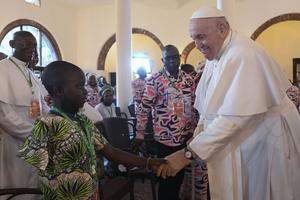Pope Francis Kissed His Feet. Who Is the Cowboy-Hat-Wearing President of South Sudan?
Kiir said his 2019 meeting with Pope Francis was especially meaningful for him, as he grew up in an area of South Sudan that was evangelized primarily by Catholic missionaries, from whom he has learned much.

Pope Francis, as part of his visit to Africa this week, is meeting with the president of South Sudan, Salva Kiir Mayardit, this Friday. He will meet the leader for a photograph before retreating to a private setting for a talk.
The 71-year-old Kiir, a Catholic who has served as South Sudan’s first and only president since the country gained independence in 2011, oversees a country that is slightly smaller than Texas, 60% Christian, and severely underdeveloped and racked by ethnic tensions.
Pope Francis and Kiir met in 2019 in a meeting that was extremely memorable because of Pope Francis’ decision to kneel and kiss Kiir’s feet — and those of his rival, former vice president Riek Machar — while begging the leaders to make peace. Kiir and Machar were at the Vatican for a retreat, which Francis hosted specifically for the leaders who have been at war with each other for years. In 2013, a conflict developed between militias led by Machar and troops loyal to Kiir, who are of different tribal ethnicities.
Both sides have been accused of serious atrocities over the course of the conflict, including the raping of women, the killing of civilians, and the recruitment of child soldiers. In addition to Kiir and Machar, Francis kissed the feet of at least two other South Sudanese leaders during the meeting.
Kiir told EWTN News at the time that Pope Francis’ kissing of his feet, which garnered headlines around the world, left him “almost trembling.” He said the moment when the pope displayed such humility was inspiring to him as a Catholic and as the leader of a country.
“I felt humbled at the humility of the Holy Father, to bend down on the ground and kiss my feet,” Kiir told EWTN News in an interview May 7, 2019.
“I was almost trembling because that thing has not happened before, except at the time when Jesus knelt down to wash the feet of his disciples. And it should have been the opposite; his disciples should have been the ones to wash his feet ... this is what came into my mind when the Pope knelt down.”
Pope Francis at that retreat encouraged the South Sudanese leaders to “seek what unites you, beginning with the fact that you belong to one and the same people, and to overcome all that divides you” and told them he was praying for them to become peacemakers, who “build peace through dialogue, negotiation, and forgiveness.”
Kiir said his 2019 meeting with Pope Francis was especially meaningful for him, as he grew up in an area of South Sudan that was evangelized primarily by Catholic missionaries, from whom he has learned much. Christianity experienced extraordinary growth in South Sudan between 1901 and 1964 thanks to missionary activity undertaken by the Comboni Missionaries of the Heart of Jesus and the Missionary Sisters Pie Madri della Nigrizia.
“Jesus came to the world to teach people to forgive and to live in peace with whoever is near you. And we as Catholics, especially in South Sudan, we have learned a lot from God’s teaching,” he reflected.
Kiir is rarely seen without his distinctive Texas cowboy hat. His attachment to the headgear may have been kindled when Texan George W. Bush presented Kiir with a similar hat in 2006.
Born in 1951, a young Kiir joined a separatist movement in the 1960s, fighting against the Sudanese government in the First Sudanese Civil War. He eventually became the leader of the military wing of the separatist movement, The Sudan People’s Liberation Army (SPLA). He participated in negotiations with the northern government, which ultimately led to the Comprehensive Peace Agreement (CPA) of 2005, officially ending the war. Kiir became president of Southern Sudan, which was then an autonomous region.
In 2011, the predominantly Christian South Sudan gained independence from Sudan, which has a Muslim majority and has been governed mostly by Islamic law since the 1980s. Kiir was overwhelmingly reelected to continue leading the new nation.
As president, he has led his country through another civil war, which has killed more than 400,000 people and displaced at least 2.2 million more. Along the way, Kiir’s leadership has garnered criticism — in part because of widespread corruption in his government but also because of alleged mistreatment of journalists.
Kiir and Machar signed a tenuous peace agreement in September 2018, which the country’s Catholic bishops have called “fatally flawed” because it does not address the complex root causes of the conflict. Several other peace agreements and cease-fires since then — including several mediated by the Catholic lay group Sant’Egidio — have not led to substantial peace progress, and millions of South Sudanese people live in poverty partly thanks to the country’s underdeveloped infrastructure and economy, despite the rich agricultural potential of the region.
Kiir announced late last year that he is running again for the presidency in 2024. Rumors have reportedly circulated recently on social media that the septuagenarian Kiir is unwell, though the government has denied this.
- Keywords:
- pope francis in africa
- south sudan














